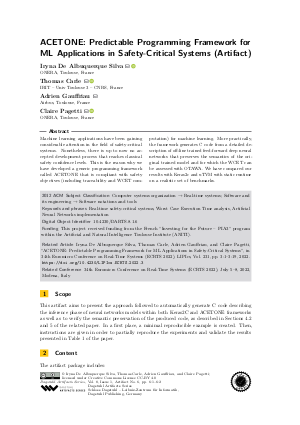ACETONE: Predictable Programming Framework for ML Applications in Safety-Critical Systems (Artifact)
Authors
Iryna De Albuquerque Silva  ,
Thomas Carle
,
Thomas Carle  ,
Adrien Gauffriau,
Claire Pagetti
,
Adrien Gauffriau,
Claire Pagetti 
-
Part of:
Issue:
Special Issue of the 34th Euromicro Conference on Real-Time Systems (ECRTS 2022)
Part of: Volume: DARTS, Volume 8 (ECOOP 2022)
Part of: Conference: Euromicro Conference on Real-Time Systems (ECRTS)
Part of: Journal: Dagstuhl Artifacts Series (DARTS) - License:
 Creative Commons Attribution 4.0 International license
Creative Commons Attribution 4.0 International license
- Publication Date: 2022-06-28
Artifact Description

PDF
DARTS.8.1.6.pdf
- Filesize: 389 kB
- 2 pages
Document Identifiers
Subject Classification
ACM Subject Classification
- Computer systems organization → Real-time systems
- Software and its engineering → Software notations and tools
Keywords
- Real-time safety-critical systems
- Worst Case Execution Time analysis
- Artificial Neural Networks implementation
Metrics
- Access Statistics
-
Total Accesses (updated on a weekly basis)
0Document
0Metadata
Artifact
DARTS-8-1-6-artifact-41ab74c69d68149a2c966faa52ac59bf.zip
(Filesize: 1.29 GB)
MD5 Sum:
41ab74c69d68149a2c966faa52ac59bf
(Get MD5 Sum)
Abstract
Machine learning applications have been gaining considerable attention in the field of safety-critical systems. Nonetheless, there is up to now no accepted development process that reaches classical safety confidence levels. This is the reason why we have developed a generic programming framework called ACETONE that is compliant with safety objectives (including traceability and WCET computation) for machine learning. More practically, the framework generates C code from a detailed description of off-line trained feed-forward deep neural networks that preserves the semantics of the original trained model and for which the WCET can be assessed with OTAWA. We have compared our results with Keras2c and uTVM with static runtime on a realistic set of benchmarks.
Cite As Get BibTex
Iryna De Albuquerque Silva, Thomas Carle, Adrien Gauffriau, and Claire Pagetti. ACETONE: Predictable Programming Framework for ML Applications in Safety-Critical Systems (Artifact). In Special Issue of the 34th Euromicro Conference on Real-Time Systems (ECRTS 2022). Dagstuhl Artifacts Series (DARTS), Volume 8, Issue 1, pp. 6:1-6:2, Schloss Dagstuhl – Leibniz-Zentrum für Informatik (2022)
https://doi.org/10.4230/DARTS.8.1.6
BibTex
@Article{dealbuquerquesilva_et_al:DARTS.8.1.6,
author = {De Albuquerque Silva, Iryna and Carle, Thomas and Gauffriau, Adrien and Pagetti, Claire},
title = {{ACETONE: Predictable Programming Framework for ML Applications in Safety-Critical Systems (Artifact)}},
pages = {6:1--6:2},
journal = {Dagstuhl Artifacts Series},
ISSN = {2509-8195},
year = {2022},
volume = {8},
number = {1},
editor = {De Albuquerque Silva, Iryna and Carle, Thomas and Gauffriau, Adrien and Pagetti, Claire},
publisher = {Schloss Dagstuhl -- Leibniz-Zentrum f{\"u}r Informatik},
address = {Dagstuhl, Germany},
URL = {https://drops.dagstuhl.de/entities/document/10.4230/DARTS.8.1.6},
URN = {urn:nbn:de:0030-drops-165023},
doi = {10.4230/DARTS.8.1.6},
annote = {Keywords: Real-time safety-critical systems, Worst Case Execution Time analysis, Artificial Neural Networks implementation}
}
Author Details
Funding
This project received funding from the French "Investing for the Future - PIA3" program within the Artificial and Natural Intelligence Toulouse Institute (ANITI).
Related Article
- Iryna De Albuquerque Silva, Thomas Carle, Adrien Gauffriau, and Claire Pagetti, "ACETONE: Predictable Programming Framework for ML Applications in Safety-Critical Systems", in 34th Euromicro Conference on Real-Time Systems (ECRTS 2022), LIPIcs, Vol. 231, pp. 3:1-3:19, 2022. https://doi.org/10.4230/LIPIcs.ECRTS.2022.3
